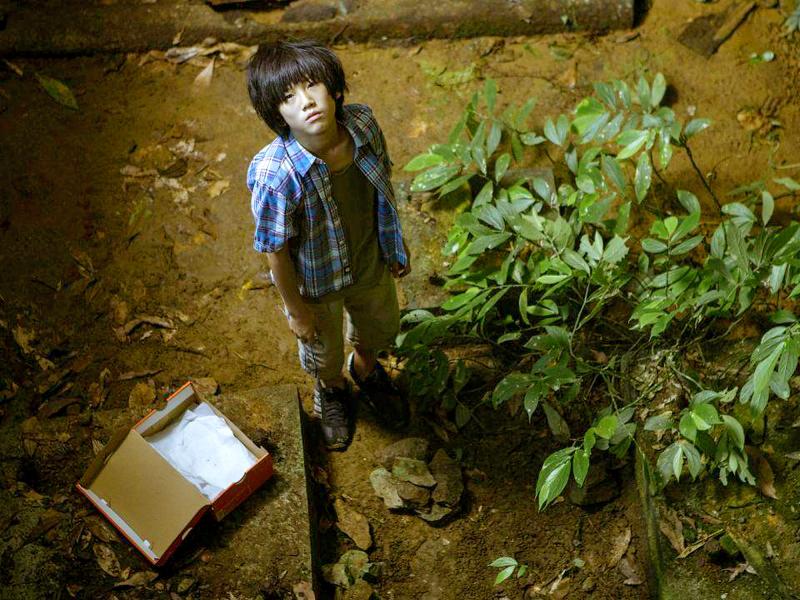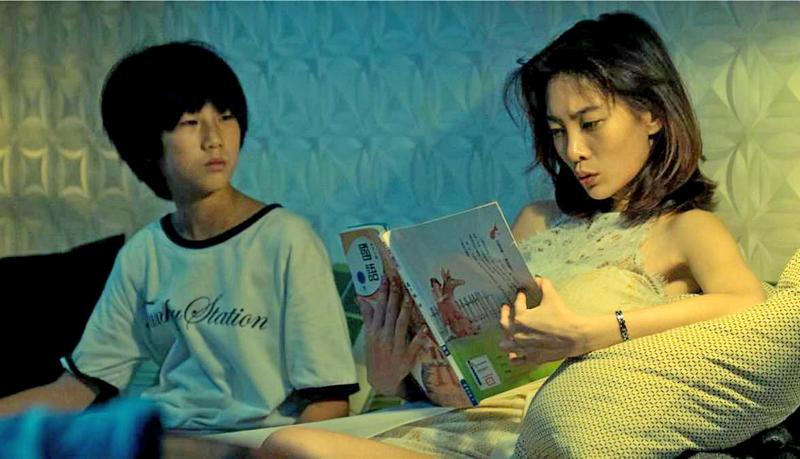Wild Sparrow (野雀之詩) is simple and extremely slow paced, told through the eyes of Han (Kao Yu-hsia, 高於夏), an introspective, shy grade schooler who lives with his great-grandmother in the verdant countryside.
Han has a fascination with sparrows, which are either flying high in the sky or trapped in cages and nets, providing a constant metaphor throughout the film. In the most ironic scene, a man catches the birds just to charge people to set them free again, taking advantage of Buddhists who engage in the ritual of “releasing” animals from captivity. Han takes a badly injured sparrow home and buries it when it dies, and his idyllic and innocent life ends there.
Like most rural areas in Taiwan, the bulk of the population has left for work in the cities, leaving old people and children behind. While the scenery is stunning, the lack of human presence is haunting as those who remain do what they can to scrape by.

Photo courtesy of Hooray Films
Han is suddenly whisked to the urban jungle of Jhongli (中壢) when his elementary school shuts down — another common phenomenon in rural areas — staying with his young mother Li (Lee Yi-chieh, 李亦捷) who leads a dysfunctional life, bouncing between bad and often abusive relationships, hostess clubs and prostitution to survive.
The film was nominated for several awards in last year’s Taipei Film Festival (台北電影節), with Lee winning Best Actress, but it did not make its box office premiere until last week.
Lee does a superb job depicting the life of Li, a lost woman who often returns home drunk or with a man while acting erratically toward Han. She is loving and overbearing and resentful toward Han at the same time, delivering a complex and heartfelt performance that is surely worthy of her award.

Photo courtesy of Hooray Films
It’s a poignant exploration of people from less fortunate backgrounds, especially women, who fall through the cracks. Li is also a sparrow, longing to be free but unable to break out of the cycle of being controlled by men in all aspects of her life. These men use her for their own desires and purposes, and Han has nobody to look up to despite being a model student praised by his teachers. Li does attempt to act as a protector to Han, but she is hardly able to protect herself and put her life together, let alone care for him.
Shih’s atmospheric, dreamlike sequences are loaded with raw emotion that cut to the bone and makes up for the lack of overall narrative. The 4:3 format focuses the audience’s perspective into a more claustrophobic, confined space, enhancing the feelings of helplessness and despair. When not looking through Han’s eyes, the viewer is placed right on the periphery of each scene, behind a tree, door, curtain or window, close enough to feel Han’s and Li’s pain, but all one can do is endure it with them while the events unfold.
The lighting, color and composition of each scene, from the lush, lonely hills to the colorful shining lights of the hostess clubs to the muted cold tones of Li’s apartment, are all carefully calculated, and they blend into each other in brief moments. Every scene is like a painting, and perhaps only by detaching from reality and employing surreal, almost fantastical aesthetics can one bear the hopelessness of the characters’ situations.
The resulting product, as the movie’s Chinese-language title suggests, is a tragically beautiful poem that fully captivates the viewer and immerses them in the suffocating world that Han and Li live in. Shih has done a masterful job in his full-length debut, and Wild Sparrow is a prime example of a slow-moving arthouse movie that doesn’t bore.

Jacques Poissant’s suffering stopped the day he asked his daughter if it would be “cowardly to ask to be helped to die.” The retired Canadian insurance adviser was 93, and “was wasting away” after a long battle with prostate cancer. “He no longer had any zest for life,” Josee Poissant said. Last year her mother made the same choice at 96 when she realized she would not be getting out of hospital. She died surrounded by her children and their partners listening to the music she loved. “She was at peace. She sang until she went to sleep.” Josee Poissant remembers it as a beautiful

For many centuries from the medieval to the early modern era, the island port of Hirado on the northwestern tip of Kyushu in Japan was the epicenter of piracy in East Asia. From bases in Hirado the notorious wokou (倭寇) terrorized Korea and China. They raided coastal towns, carrying off people into slavery and looting everything from grain to porcelain to bells in Buddhist temples. Kyushu itself operated a thriving trade with China in sulfur, a necessary ingredient of the gunpowder that powered militaries from Europe to Japan. Over time Hirado developed into a full service stop for pirates. Booty could

Lori Sepich smoked for years and sometimes skipped taking her blood pressure medicine. But she never thought she’d have a heart attack. The possibility “just wasn’t registering with me,” said the 64-year-old from Memphis, Tennessee, who suffered two of them 13 years apart. She’s far from alone. More than 60 million women in the US live with cardiovascular disease, which includes heart disease as well as stroke, heart failure and atrial fibrillation. And despite the myth that heart attacks mostly strike men, women are vulnerable too. Overall in the US, 1 in 5 women dies of cardiovascular disease each year, 37,000 of them

Before the last section of the round-the-island railway was electrified, one old blue train still chugged back and forth between Pingtung County’s Fangliao (枋寮) and Taitung (台東) stations once a day. It was so slow, was so hot (it had no air conditioning) and covered such a short distance, that the low fare still failed to attract many riders. This relic of the past was finally retired when the South Link Line was fully electrified on Dec. 23, 2020. A wave of nostalgia surrounded the termination of the Ordinary Train service, as these train carriages had been in use for decades